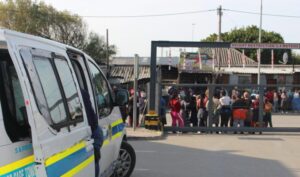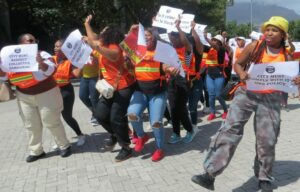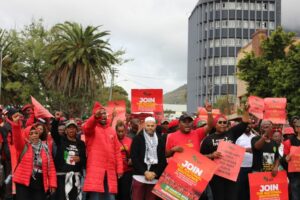Public sector unions affiliated to Cosatu, Saftu and Fedusa, unwavering in their demand for a 10% increase, have threatened a full-blown strike on the 2nd of December if their employer doesn’t concede. Their rejection of the imposed increase of 3% hasn’t waned. They told this to the acting Minister of Public Service and Administration Thulas Nxesi who came to accept their memorandum during the unions’ march to the national treasury head offices on Tuesday. They gave government seven days to respond and come up with an improved wage offer.
In addition to a 10% increase, the unions are demanding an end to government’s attack on collective bargaining and the implementation of the public service bargaining council resolution of 2018, an immediate review of the cost of contracting in the state, the reversal of austerity measures targeting the public sector, the insourcing of services that they say have been outsourced to businesses owned by politicians, and the filling of vacant posts.
The failure to implement the collective bargaining council resolution and tightened austerity measures have resulted in workers experiencing a declining standard of living, heavier workloads, deteriorating working conditions and a deeply demoralised public service workforce.
One of the workers who attended the march, Khosi Congwane says that after 13 years working as an administrator at the Government Pension Administration Agency, he still earns a paltry salary which doesn’t cover all his monthly expenses. His commute from his home in Winterveld to work in Pretoria CBD costs R70 a day, over R1,000 in a month. “On top of that I have two children who are still in school and I’m the only breadwinner. Our government is really playing with us. We are at the forefront of providing services but they don’t care. They should be thinking highly of us,” he says.
His counterpart in Nehawu, who has been a social worker since 1992, says next year in May she will be retiring but sadly has nothing to show for her many years of service. “I’m highly qualified with more than two degrees but my salary band hasn’t much improved. This is what makes social work profession unpalatable as a career to follow because the entry salary is very low and the progression is not rapid as one would expect,” she says.
Acting Public Service and Administration Minister Thulas Nxesi received a hostile reception when he came out to meet protesting public sector workers.
Addressing the gathering, the first deputy president of Cosatu, Mike Shingange says they feel betrayed by their comrades who are now deployed in government. He says during the dark days of apartheid, the labour movement together with the liberation movements fought side-by-side, against anti-majoritarianism. “Today we are the victims of our own struggle and success. Today our own comrades whom we have trained in the labour movements as shop stewards, secretary generals and later became ministers in government, have turned against us,” he laments.
Thulas Nxesi is a former general secretary of the teachers’ union, Sadtu, which accepted the 3% offer. The Minister of Finance Enoch Godongwana, whom the unions accuse together with Nxesi as instrumental to the unilateral implementation of the 3% wage increase, was the general secretary of metalworkers union, Numsa, from 1993 to 1996.
Building the momentum towards the 2nd of December, workers say they will be continuing with pickets and demonstrations at their various workplaces and if needs be, there will be a total shutdown and withdrawal of labour including essential services on that day .





